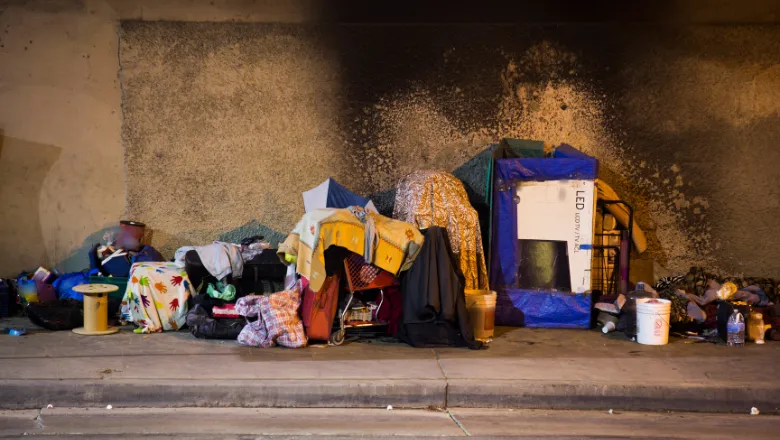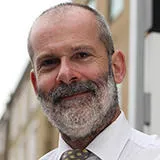For too long, the mental health of those most excluded from society has been overlooked. In HOPE we seek to focus attention on the needs and priorities of those who are homeless and experience mental illness in diverse settings in Africa, while working collaboratively to propose workable solutions
Professor Charlotte Hanlon, Centre for Global Mental Health, King’s College London
10 November 2022
New NIHR Global Health Research Group on homelessness and severe mental illness in Africa receives £3 million funding
A major new project which aims to address the needs of people experiencing homelessness and severe mental illness (SMI) in Ethiopia, Ghana and Kenya has been backed by funding from the National Institute for Health and Care Research (NIHR).

The project, entitled ‘HOPE’, will be co-led by Professor Charlotte Hanlon, Co-Director of the Centre for Global Mental Health (CGMH) at King’s College London, and Professor Atalay Alem of Addis Ababa University. Project partners include BasicNeeds-Ghana (Peter Yaro), University of Ghana (Dr Phyllis Dako-Gyeke), the Africa Mental Health Research and Training Foundation (Professor David Ndetei and Dr Victoria Mutiso), the Centre for Innovative Drug Development and Innovative Trials for Africa at Addis Ababa University (CDT-Africa; Professor Abebaw Fekadu), representative organisations for people with lived experience of mental illness, Ministry of Health Representatives from Ethiopia, Ghana and Kenya, and colleagues from CGMH, the World Health Organization, CBM Global, University of Nottingham, University of Warwickand George Washington University, USA.
Co-occurrence of homelessness and SMI, including schizophrenia, bipolar disorder and severe depression, is a health and social emergency affecting an estimated 28-36 million people in low- and lower middle-income countries (LLMIC). However there is no high-quality evidence to show which interventions are effective in these settings.
The HOPE project will develop and test community-based interventions to address the needs of people who are homeless and have SMI. A total of £2,999,974 NIHR funding was awarded for the project to run in sites across Ethiopia, Ghana and Kenya from September 2022 to September 2026. The project will create a new partnership of researchers, policy makers, community members and people with lived experience of SMI and homelessness. It will work in a capital city (Addis Ababa) in Ethiopia, a regional city (Tamale) in Ghana, and a rural county (Makueni) in Kenya to understand the different approaches needed across varied settings.
People who experience homelessness and SMI are at high risk of human rights violations, premature mortality and social exclusion, but the absence of evidence on effective interventions is a potent barrier to global action. Previous work from the Ethiopia team working with CGMH has shown that two in five homeless people assessed in Addis Ababa had SMI, and that one in three people with SMI in rural Ethiopia had slept unsheltered. There is a clear need to develop partnerships and capacity for Africa-led research to tackle this complex problem.
In HOPE we are building on a long track record of interventions for people with severe mental illness in each of our countries so that we can develop ways to respond to the challenges faced by people who are also homeless. Working with policymakers and people with lived experience from the beginning is going to help us to maximise the impact of the work
Professor Atalay Alem, Addis Ababa University
The project will work in three phases: phase one will map existing contexts, lived experience, needs, priorities and opportunities through ethnography and surveys; phase two will co-produce and pilot intervention packages; phase three will test the intervention packages in specific geographic areas to reach 350 people experiencing homelessness and SMI per site.
HOPE to transform mental health that includes the homeless!
Peter Yaro, BasicNeeds-Ghana
By the end of the project, researchers hope to have:
- Developed evidence-supported interventions to improve the lives of people who are homeless and have SMI relevant for diverse settings in Africa.
- Produced a manual on how to adapt and implement the programme in different settings.
- Developed methods, ethical frameworks and the capacity of early career researchers and other stakeholders in Ethiopia, Ghana and Kenya to work in this area.
- Built a strong collaboration of multi-sector partners to sustain future in-country work and longer-term high-quality research on this neglected topic.
We are excited to announce that finally, our project “HOPE” brings HOPE to the homeless in a context where HOPELESSNESS is the norm.
Dr Victoria Mutiso, AMHRF, Kenya
The NIHR Global Health Research Portfolio uses UK aid to fund high quality applied health research and training in areas of unmet need for the direct and primary benefit of people in low- and middle-income countries (LMICs). The Global Health Research Groups programme aims to generate the scientific evidence that can improve health outcomes for people in low resource settings through improving practice and informing policy. The programme also strengthens research and research management capacity and capability to support the future sustainability of research in partner countries.
For more information, please contact Patrick O’Brien (Senior Media Officer)





